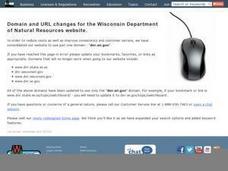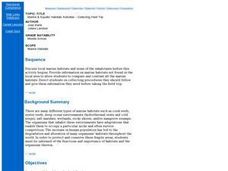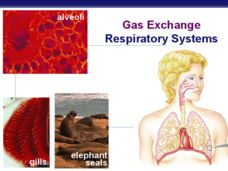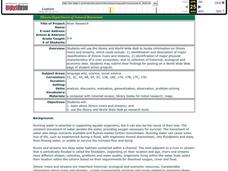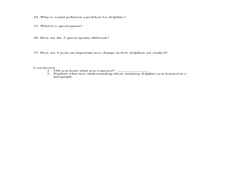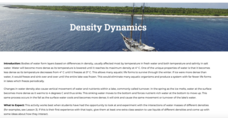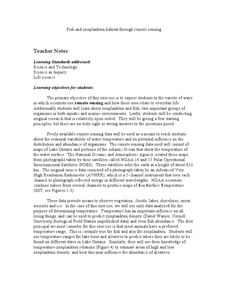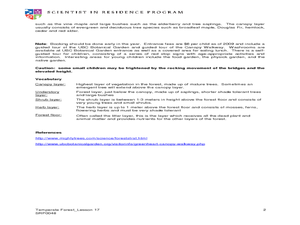Curated OER
Water and Land Ecosystems
Students investigate the differences between a land and aquatic ecosystem. They use the information in order to present it in an assessment. There are target questions that can be used to guide research, lead a classroom discussion, or...
Curated OER
Environmental Science/Water Pollution
Students study natural habitats, aquatic life, renewable and non-renewable resources. They discuss conservation efforts for sea otters and desert toad in this units.
Curated OER
Science: Dissolved Oxygen and Water Quality Sampling
Students perform tests to determine the level of oxygen dissolved in water. After examining a table displaying the temperature and solubility of water, they examine the three stages involved in the test. Upon completion, students explain...
Curated OER
Monitoring Aquatic Ecosystems Lesson Plan
Students perform an experiment to test the quality of the water in a marsh.
Curated OER
Amphipods
High schoolers identify organisms that live at the bottom of the body of water. For this biology lesson, students evaluate the effects of pollution to amphipods population. They examine collected data and create a bar graph comparing them.
Curated OER
Biomes
In this biomes worksheet, students review the characteristics of aquatic biomes and terrestrial biomes. This worksheet has 12 fill in the blank, 6 multiple choice, and 4 short answer questions.
Curated OER
Critters of the Water
Students examine different organisms in various marine habitats. They identify any adaptations that have allowed the organisms to survive. They develop an imaginary organism and describe its life cycle.
Curated OER
Collecting Field Trip
Students identify and describe each marine habitat. They name organisms that can be found in each habitat and discover ways in which to protect them. They participate in an activity to complete the lesson.
Curated OER
Benthic Bingo
Students identify organisms of a benthic community. They place the correct organism in the correct community and practice using marine terms. They play this game like a game of bingo.
Curated OER
Surface Tension Grabbers
Students explore why surface tension is such a very important biological concept. Determination is made on why the myriad of biota that interacts at the air-water interface are vital components of aquatic and marine ecosystems. They...
Curated OER
Gas exchange: Respiratory Systems
The need for a respiratory system in humans versus being reliant on gas exchange structures is demonstrated. There are many details about the advantages and disadvantages of each mechanism. Students are able to learn about the...
Curated OER
Invasives and Macroinvertebrates
Students view macroinvertebrates, or discuss previous collection activity. They graph data on macroinvertebrates in the Hudson River. Students discuss the relationship between habitat, environmental changes, and invertebrate diversity or...
Curated OER
River Research
Students use the internet to research the streams and rivers found in Illinois. Using the information, they identify and describe the rivers and streams along with the physical characteristics of a river ecosystem. They share what they...
Curated OER
Collecting Plankton
In this science worksheet, students learn facts about plankton by reading two pages of factual information. Students read about the different kinds of plankton and how it is classified. Detailed drawings are included. There are no...
Curated OER
Understanding How Researchers Study Dolphins
Learners examine how researchers study dolphins and whales. In this scientific research lesson, students complete a Web-based interactive lesson focused on showing how researchers study aquatic mammals. A worksheet and web resources are...
Curated OER
Mouthwatering Mollusks
Students investigate various forms of aquatic life. They use four senses, touch, taste, smell, and observation to explore mollusks. Students cook and taste various types mollusks, such as mussels, scallops, and squid.
Curated OER
Build An Island
Students explore erosion. In this science lesson, students build an island and observe the effects of erosion on the island. Students discuss freshwater ecosystems in Hawaii.
Curated OER
Density Dynamics
Students set up working models demonstrating lake turnover and the formation of deep water masses in the oceans.
Curated OER
Microfishing
Students use a simple method to collect living microorganisms from natural and/or artificial environments and develop skills in microscopy, observation, drawing, speculation, hypothesizing, oral presentation, and raising questions.
Curated OER
Fish and Zooplankton Through Remote Sensing
Ecology aces examine sea surface temperature maps and relate temperatures to concentration in fish and zooplankton populations. Take your class to a computer lab and provide experience with actual remote sensing data. Some of the links...
Curated OER
Land Plants and Algae
Young scholars compare and contrast algae and land plants. In this plant lesson students discover what algae and land plants require for growth. The young scholars discuss experimental design. The students experiment with different...
Curated OER
Tree Top Canopy Field Trip
Students visit the Greenheart Canopy Walkway. In this environmental lesson, students experience a coastal rain forest ecosystem. Students interact and explore the different layers of the rain forest.
Curated OER
The Wonderful World of Slugs
Examine a slug? Of course, what else would a 2nd grader do with it? Pupils use clues and go on a slug hunt, read a slug story, or make a cooperative group mural of a slug's habitat. While older learners catalog slugs, go on a slug hunt,...
Curated OER
How Do Plants and Animals Change the Environment Around Them?
If you have elodea and snails in your classroom aquarium, or if you have access to a pond with these organisms, your young biologists can set up a controlled experiment to determine how certain ecosystems respond in light and dark...





